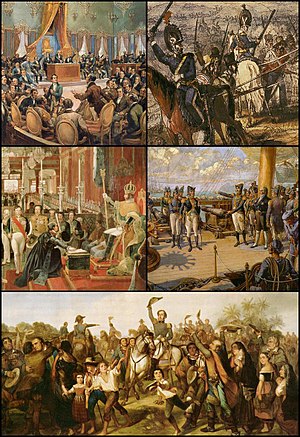Amicable War: Difference between revisions
mNo edit summary |
mNo edit summary |
||
| Line 21: | Line 21: | ||
*[[Articles of Union (Satucin)|Articles of Union]] | *[[Articles of Union (Satucin)|Articles of Union]] | ||
*Establishment of the [[Satucin|Union of the Satucins]] | *Establishment of the [[Satucin|Union of the Satucins]] | ||
*[[Parane]] and [[Îles d'émeraude]] withheld from | *[[Parane]] and [[Îles d'émeraude]] withheld from [[Satucin|the Union]] | ||
| status = | | status = | ||
| combatants_header = | | combatants_header = | ||
Revision as of 22:44, 21 July 2019
| Amicable War | |||||||
|---|---|---|---|---|---|---|---|
 | |||||||
| |||||||
| Belligerents | |||||||
|
Unitariens Dominionistes |
Fédéralistes | ||||||
The Amicable War, also known as the Satucine Civil Wars and the Brother's War were a series of civil wars, rebellions and political conflicts that took place in Satucin from 1811 to 1845. The conflicts were motivated by frustrations with political reform. A key shared goal by the colonies was responsible self-government, which was eventually achieved in the incidents' aftermath.
The main antagonists were, on a geographical level, The Province of Anniane against the other provinces of modern Satucin, and on a political level, the x Party versus the x Party. The central cause of the conflict was the excessive centralism advanced by Anniane leaders and, for a long period, the monopoly on the use of the Port of Aneville as the sole means for international commerce. Other participants at included the Vendéens, a loose coalition of militia groups staunchly loyal to Gaullica, and Gaullica herself, which maintained a flexible and shifting policy towards the colonies.